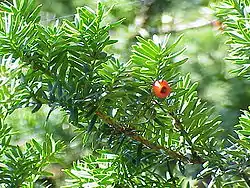一位
Japanese
Noun
Derived terms
- 散一位 (san ichi-i)
- 従一位 (ju ichi-i)
- 正一位 (shō ichi-i)
Etymology 2

一位 (ichii): the Japanese yew.
| Kanji in this term | |
|---|---|
| 一 | 位 |
| いち Grade: 1 |
い Grade: 4 |
| goon | |
Based on the the first in rank in the Japanese medieval court sense, from the 笏 (shaku, “baton”) they hold made of yew.[1][2]
Noun
一位 (hiragana いちい, katakana イチイ, rōmaji ichii, historical hiragana いちゐ, historical katakana イチヰ)
Usage notes
- As with many terms that name organisms, this term is often spelled in katakana, especially in biological contexts, as イチイ.
- Not to be confused with いちい樫 (ichiigashi, “Quercus gilva”), which is also shortened to ichii.
Derived terms
- イチイ科 (ichii-ka)
See also
- 榧 (kaya)
- 伽羅木 (kyaraboku)
Etymology 3
| Kanji in this term | |
|---|---|
| 一 | 位 |
| ひと Grade: 1 |
くらい Grade: 4 |
| kun’yomi | |
Compound of 一 (hito, “one”) + 位 (kurai, “degree, rank”). (Can this(+) etymology be sourced?)
Noun
一位 (hiragana ひとくらい, rōmaji hitokurai, historical hiragana ひとくらゐ)
Etymology 4
Various nanori readings.
Proper noun
一位 (hiragana いつい, rōmaji Itsui, historical hiragana いつゐ)
- a female given name
一位 (hiragana かずい, rōmaji Kazui, historical hiragana かずゐ)
- a male or female given name
一位 (hiragana かずのり, rōmaji Kazunori)
- a male given name
This article is issued from Wiktionary. The text is licensed under Creative Commons - Attribution - Sharealike. Additional terms may apply for the media files.